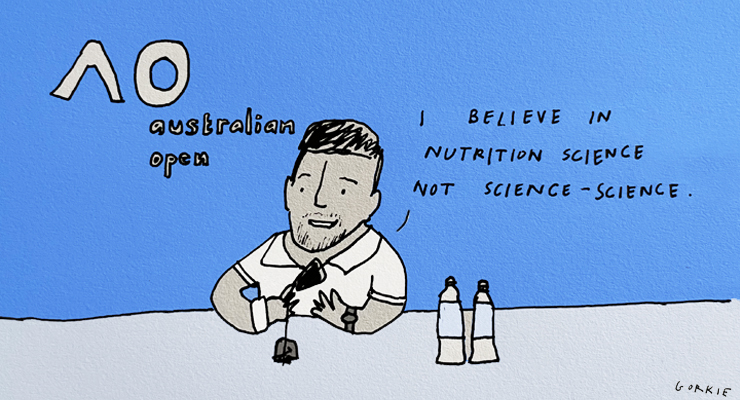
The 2022 Australian Open, set to be held in January, will be the first truly international event hosted since Australia’s vaccination-based reopening. And the men’s No. 1 and defending champion Novak Djokovic is a vaccine sceptic (to put it kindly).
Djokovic’s vaccine status is technically unknown, but his refusal to reveal it, paired with his anti-vax comments and unconventional approach to health, has led many to assume he is not vaccinated. Perhaps he is vaccinated and is having a laugh. But that’s not the point. The Djokovic situation raises a bigger dilemma about Australia reopening to the world.
As it stands, there is no definitive answer for how unvaccinated people seeking to enter Australia will be dealt with. The conflicting back and forth statements made by Immigration Minister Alex Hawke, Victorian Premier Dan Andrews and Prime Minister Scott Morrison demonstrate that it is far from settled.
Even if quarantine is on the table for unvaccinated players as Morrison suggested, various players have said they wouldn’t come to Australia again if it was required.
And although Djokovic has been the first high-profile case, he’s unlikely to be the last unvaccinated sports star who, by choice or force, will consider skipping a trip to Australia.
While Australia once grappled with the ethics of allowing film stars to skip quarantine for the economic benefit their productions brought, our moral dilemma will now turn to whether we let unvaccinated sports stars, performers and personalities in to contribute to resumption of large-scale events.
In this particular case, it seems obvious that Djokovic should just get on with it and get vaccinated. If he skips the Australian Open because of a vaccine mandate, he’ll pass up the chance to defend his title, lift a record-extending 10th trophy at Melbourne Park and, most importantly, secure the all-time men’s grand slam record at his most successful tournament. Forgoing all that would suggest his anti-vaccination stance runs deep.
And he’s not the only one.
Sport stars may well be more likely to resist vaccines than your regular citizen. To reach the peak of most sports, an athlete must maintain complete care and control over what enters their body, with many of them, Djokovic included, subjecting themselves to diets so regimented that maintaining it requires the full-time assistance of chefs and nutritionists. Djokovic credits a new approach to his diet and health with transforming him into the formidable player he is now, where his fitness used to be a weakness.
Although the science confirms that vaccinating against COVID-19 — and certainly the lingering symptoms of long-COVID — would ultimately be the best thing for any individual, it’s not hard to see why sports stars represent some of the highest profile and most vocal anti-vaxxers. For examples see surfing’s Kelly Slater, the NBA’s Kyrie Irving, and various European footballers and Australian rugby players.
This is not to say they deserve special treatment, nor that they should not further educate themselves or be held responsible for the misinformation they spread. Instead, this observation demonstrates that anti-vaxxer sports stars are likely to be a recurring issue in future.
As Australia turns towards becoming an open society predicated on high vaccine coverage, how long will COVID vaccination status prevent notable stars from competing here? And what will the ramifications be?
Even in the world of tennis, there are multiple top players who are either anti-vaxxers or have expressed concerns about the vaccine. Women’s No. 2 Aryna Sabalenka has said she’d get the vaccine only if she had to, but did not “trust” it. Men’s No. 3 Stefanos Tsitsipas refused to confirm his vaccination status, casting doubt over his participation in the next slam.
In revealing their hesitations, both players spread common misconceptions about the speed at which the vaccines received approval. For this perhaps they deserve to be shunned — but it will come at a cost to the Australian Open.
The slam is already likely to go ahead without injury-addled Roger Federer, and Rafael Nadal’s keenness to play is also in question. An Australian Open without any members of the big three is a harder sell for more casual tennis fans, a fact Tennis Australia is well aware of.
Even beyond Djokovic, there is potential for various members of the top 10 women and men to be missing from the draw. The situation is made more tenuous by forces in the tennis world that think the Asia-Pacific slam should be held elsewhere. If unvaccinated players can’t enter Australia, they may add their voices to those calling for a move from Melbourne Park for the calendar’s first grand slam.
Tennis aside, the decisions made at this first juncture will reverberate around Australia’s post-COVID environment. How seriously we take the pledge of banning the unvaccinated may change the course of major sporting competitions and cultural events in future. That’s not to say Australia shouldn’t take the hard line — merely that we must consider what’s at stake.
Should sports stars and celebrities be given an easy unvaccinated ride into Australia? Let us know your thoughts by writing to letters@crikey.com.au. Please include your full name if you would like to be considered for publication in Crikey’s Your Say column. We reserve the right to edit for length and clarity.








Oh look! There goes the (word starting with F and ending with K) I do not give. I think what this article is saying is that some tennis players among the top world rankings are hesitant or coy about getting vaccinated against C19. Well, that’s fine. They don’t have to be vaccinated if they don’t want to. They don’t have to come to Australia either.
Agreed.
I wonder what happened to the narrative in Australia recently when we went from being worried if someone was actually infected with SARS-Cov-2 to whether or not they are vaccinated. Particularly since the vaccines, though effective at reducing hospitalisations, don’t fully prevent infection or spread and were recently reported to have 10 weeks maximum effectiveness (ABC), waning after 5 months.
If COVID is endemic in Australia, as states are now moving towards removing restrictions and allowing the spread of the disease throughout the community, what does it matter whether someone coming in to compete in a sporting event is vaccinated or not? Surely it is more important that they test negative to the disease? (And aren’t entering with a new variant).
I am genuinely interested to know what authorities are worried about?
That the sports star will catch it and then take up a valuable hospital bed?
Or catch it and miss the tournament, upsetting fans, reducing profits? (I’m assuming people with COVID will still isolate, as is appropriate).
Perhaps governments are just concerned that they are seen to be doing something… anything? Are they choosing to make an example of people whose personal views don’t align with the general consensus rather than implementing sensible evidence-based requirements?
Scott Morrison announced early on that vaccines would not be mandatory.
Six months ago people who suggested we could be faced with vaccine passports for services within our own country were considered conspiracy theorists.
Now we wonder whether someone can even enter our country who is not vaccinated, with no thought as to whether they actually have COVID or not.
Let’s get some perspective, respect and balance back to our public policy and our discussions.
By all means require unvaccinated players to quarantine if it’s the public policy in the best interest of Australians and informed by the best evidence available. Exceptions shouldn’t be made for celebrities. If they choose not to come, so be it. But even sports stars deserve their privacy. Whether or not Djokovic is vaccinated is nobody’s business but his own.
How refreshing – a responsible post at last – very few & far between.
Maybe they’re concerned that if you let in a tennis star who openly says they haven’t vaxxed (or refuses to disclose their vax status), you don’t have much of a leg to stand on when banning ordinary Joes and Joesses from entering if they are not vaxxed. He needs to stop whining, people like you need to stop whining, and we need to start focussing on more important things than the stupidity of anti vaxxers. There’s a rule. If they don’t like it, they can go somewhere else. Now, wasn’t there something about climate change going on?
Why would we ban anyone, vaxxed or not, from entering if they don’t actually have the disease when they come? Are doubled vaxxed people tested for Covid before they are allowed in? The assumption that being vaxxed is the panacea for ending Covid, seems to be the one being pushed very hard by our governments, with little to nothing being said about the fact that vaxxed people can still catch and spread.
The absence of Djokovic will potentially make the competition more interesting.
To be fair, an alien concept little understood today, Djokovic has good grounds for his obduracy.
At the start of the panicdemic he hosted a tournament and partied afterwards, with some dozens of other fit young athletes and the wags, created a cluster as per Epidemiology 101, and recovered.
All those participants, ipso facto, now have more robust and efficacious antibodies to covid than any quadruple vaxxed spectator in the mingling melee.
Not so. https://www.bbc.com/news/health-52446965
The NSW Health Department agrees.
If we let unvaxed sports stars in, we have lost the battle with vaccination, and with COVID more generally.
Agree Peter, and it makes a mockery of the whole country, once again – that it all comes down to the Haves and Have Nots.
If you’re rich and famous, from Hollywood or Tennis or Formula 1 …it’s ok to be unvaccinated and enter/leave Australia.
But the rest of us??
F1 has already been to at least one country that required all their people were vaccinated – that is, all team members and officials.
I doubt a vaccination mandate will be a problem for them.
Just to clarify please, are you implying that we’re winning the battle with COVID at the moment?